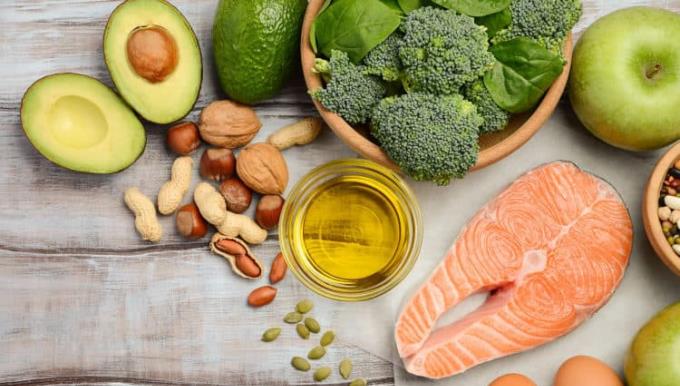Ways to determine an infants caloric needs

Learn how to determine your baby’s caloric needs, including the calories in breast milk and formula, to ensure your infant gets the right nutrition for healthy growth.
Do you know the health benefits of omega 3, especially the development of children? Let aFamilyToday Health learn about this issue.
Omega-3s can prevent and support the treatment of heart disease, depression, rheumatism, attention deficit hyperactivity syndrome (ADHD), skin problems, dementia, dyslexia, asthma, and obesity. Obesity ... Thereby, you can see how important omega-3 is to health, including children. This is an important fat that the body needs. However, it cannot be produced on its own and depends heavily on the child's diet.
Omega-3 is a type of polyunsaturated fatty acids (PUFAs), which are precursors of eicosapentaenoic acid (EPA) and docosahexaenoic acid (DHA). These two fats are essential for children's brain growth and development. DHA and EPA are commonly found in fish oils such as mackerel, tuna, and some other seafood.
In this group there is also the prefix DHA, alpha-linolenic fatty acid (ALA) found in vegetable oils such as flaxseed oil, soybean oil ... People who do not eat fish will not have DHA and EPA. However, DHA and EPA can be synthesized in the body through ALA.
Regularly feed your baby foods high in omega-3 to make sure they get enough of these fatty acids. A lack of omega-3 can lead to a weakened immune system, problematic skin and susceptibility to disease. In addition, omega-3 also helps strengthen memory, development of thinking and maintain high concentration for the baby.
Omega-3s are an essential part of the structure of a cell. When absorbed, this fat will be accumulated in cell tissue to help the organs of the body grow.
Omega-6 and omega-3 are an important component of cell membranes. They function for energy generation and function like bio-lipid mediators. However, omega-3 will compete with omega-6. This means that omega-6 suppresses the immune system, while omega-3 strengthens the immune system.

Omega-3 is essential for your baby's health, helping to solve skin problems, heart problems, and joint pain ... Here are some of the benefits of omega-3:
These fatty acids increase the concentration of good cholesterol, lower triglycerides and fats in the blood. People who take fish oil every day have more good cholesterol than bad cholesterol.
Omega-3s support children's brain development. Children who are provided with enough omega-3 will have skills to coordinate hands and eyes; social skills; concentration and higher IQ.
Help improve eyesight, protect eyes.
Help increase memory, develop thinking, help children learn better.
There is no evidence that omega-3s help treat depression. However, people who eat more foods rich in omega-3 during the treatment of depression experience better performance.
Helps increase concentration.
Some studies show that omega-3 supplements may alleviate symptoms of attention deficit hyperactivity disorder (ADHD).
People with bipolar disorder taking omega-3 along with prescription medications typically have less mood swings and are less likely to recur than those who don't take extra omega-3s.
Helps reduce the symptoms of schizophrenia.
Omega-3s are very helpful in enhancing memory. This fatty acid is most often concentrated in the brain.
People who are allergic to sunlight will withstand sunlight for a certain time after taking fish oil for a while. Besides, fish oil is also very useful for people with psoriasis.
Omega-3s are very good for the body, so you should feed your baby a lot of these fatty acid-rich foods to ensure their healthy development.
Fish oil is integrated from the tissues of oily fish such as tuna, sardines, herring, salmon, salmon, and mackerel ... Oil is usually stored in the abdominal cavity, just below the gut and is rich in omega-3. .
Fish oil is rich in omega-3, beneficial for children. You can give your child foods rich in omega-3 such as fish (salmon, tuna, mackerel, herring ...), shrimp, oysters, flaxseed, walnuts, chia seeds, soybeans, beef, functional foods. However, before adding omega-3 to your baby, you should consult your doctor.
Lack of omega-3 can cause children to have weak resistance and mental retardation. However, too much omega-3 may affect your ability to fight other pathogenic bacteria. The appropriate amount of omega-3 for your baby is as follows:

Besides providing enough omega-3, you should also pay attention to supplementing other nutrients for your baby. However, do not give your child too much omega-3 as this can cause nausea, diarrhea, and even bleeding. If this is the case, take your child to the hospital to be examined immediately.
Learn how to determine your baby’s caloric needs, including the calories in breast milk and formula, to ensure your infant gets the right nutrition for healthy growth.
Discover the top 5 smartest dog breeds in the world, including Border Collie, Poodle, German Shepherd, Golden Retriever, and Doberman Pinscher. Learn about their unique traits and why they are considered the most intelligent dogs.
Discover 7 nutritious and delicious ways to cook egg porridge for babies, including recipes with cheese, pumpkin, tomato, and more. Learn how to prepare baby-friendly egg porridge with our expert tips.
After a series of medical measures they obtained a complete human vascular system profile.
Watermelon is one of the fruits that many people love, not only cheap but also delicious, nutritious and refreshing in the summer. To get delicious watermelon pieces, show off your housewives, your artistic talents to cut beautiful pieces of watermelon.
aFamilyToday Health - The digestive system and body in each baby is different. Parents need to recognize notes to deal with when babies have a food allergy!
Babies need many factors for perfect development. aFamilyToday Health shares with parents things to keep in mind when babies are 8 weeks old so that parents can take care of their babies the best!
Babies need many factors for perfect development. aFamilyToday Health shares with parents things to keep in mind when babies are 18 weeks so that parents can take care of their babies the best!
Babies need many factors for perfect development. aFamilyToday Health shares with parents things to keep in mind when babies are 28 weeks old so that parents can take care of their babies the best!
Babies need many factors for perfect development. aFamilyToday Health shares with parents things to keep in mind when babies are 32 weeks old so that parents can take care of their babies the best!








